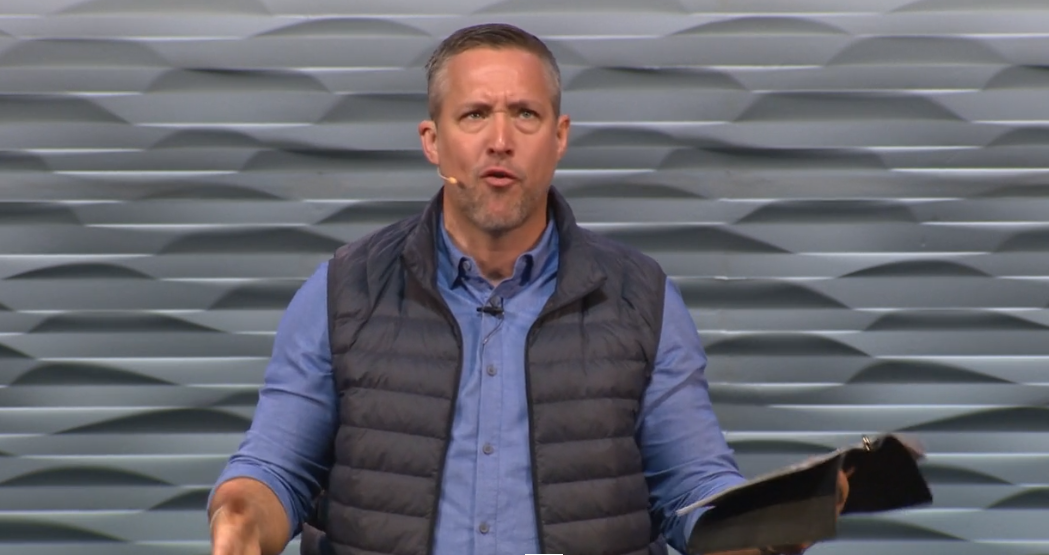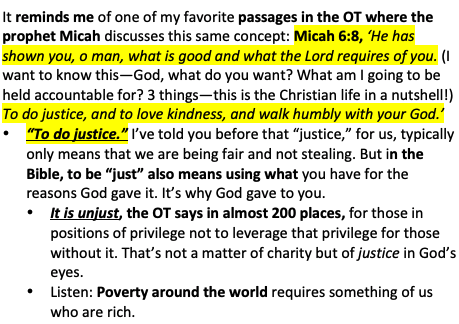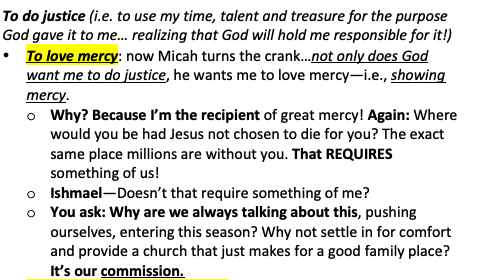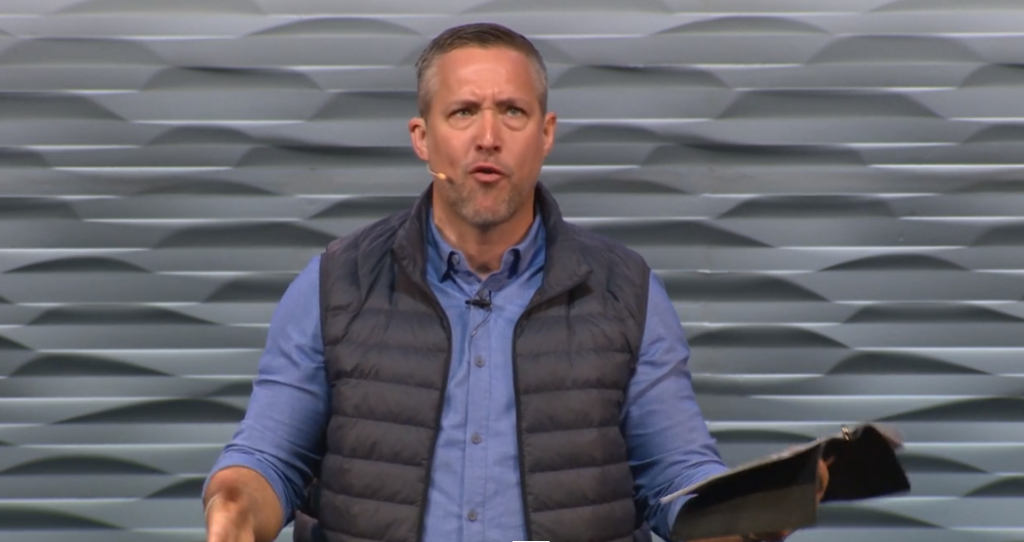
It’s no wonder that the President of the Southern Baptist Convention is a Social Justice Warrior when he mishandles a verse that many catechized children know from their youth, especially as it pertains to justice. JD Greear, the pastor of Summit Church in Durham, North Carolina, recently botched his exposition of Micah 6:8 so badly that members of Summit Church reached out to Pulpit & Pen with a video and transcript of the sermon, distraught that their pastor would confuse these very simple notions.
Beginning in October, Greear started a sermon series through Colossians. However, when he came to Colossians 1:24-29 on October 28, things took a bizarre turn.
Greear began his exposition of this passage:
24 Now I rejoice in my sufferings for your sake, and in my flesh I am filling up what is lacking in Christ’s afflictions for the sake of his body, that is, the church, 25 of which I became a minister according to the stewardship from God that was given to me for you, to make the word of God fully known, 26 the mystery hidden for ages and generations but now revealed to his saints. 27 To them God chose to make known how great among the Gentiles are the riches of the glory of this mystery, which is Christ in you, the hope of glory. 28 Him we proclaim, warning everyone and teaching everyone with all wisdom, that we may present everyone mature in Christ. 29 For this I toil, struggling with all his energy that he powerfully works within me.
It might surprise you to find out that Greear took these introductory words from Paul to the Colossians and turned them into a Social Justice text.
 How Greear turned Colossians 1:24-29 into a Social Justice text was by claiming that it “reminded him” of Micah 6:8. The connection between Colossians 1:24-29 and Micah 6:8 is known only to Greear, who did not explain the connection, except that it was one held in his own mind. Greear then turned to exposit Micah 6:8. A pdf of the sermon notes provided to the church (on left) will help examine the exegetical problem.
How Greear turned Colossians 1:24-29 into a Social Justice text was by claiming that it “reminded him” of Micah 6:8. The connection between Colossians 1:24-29 and Micah 6:8 is known only to Greear, who did not explain the connection, except that it was one held in his own mind. Greear then turned to exposit Micah 6:8. A pdf of the sermon notes provided to the church (on left) will help examine the exegetical problem.
Notice that Greear, in the transcript to the left, argues that “justice” means helping the poor. Of course, nowhere in Scripture – and I mean absolutely nowhere – is the issue of justice conflated with helping the impoverished escape poverty. Justice only demands that the impoverished have the same legal rights (not possessions) as others.
The word used in Micah 6:8 is שָׁפַט (pronounced ‘mish·pat‘) and refers to the handing down of a verdict in a court of law. The concept includes law-following and law-enforcing. Someone who is doing mish·pat is someone following God’s laws or a judge or jury punishing breakers of God’s law.
A survey of this word’s usage in the Hebrew Old Testament demonstrates this. The word, mish·pat, is used in conjunction with “judgment” and law-following in Genesis 18:19, Genesis 40:13, Exodus 21:1, and Leviticus 18:4 (just to name a few).
There are places where mish·pat and poverty or the poor are used together, like in Exodus 23:6, which declares that the poor shouldn’t be denied justice. This only strengthens the argument, however, because that passage, and others like it, are explicitly arguing that the poor should have the same right of legal recourse as anyone else. Neither this passage, nor any like it, argue that mish·pat has anything to do with giving things (possessions, food, clothing, etc…) to the poor. Mish·pat only refers to equal treatment under the law. Furthermore, let me add this strong rebuke here…
To argue that “It is unjust, the OT says in almost 200 places, for those in positions of privilege not to leverage that privilege for those without it” is beyond asinine. It is beyond absurd. First, this sentence from Greear is nothing but a pile of post-modern, Social Justice gibberish that has gone down the throat and has come back up a jumbled, gelatinous pile of regurgitated, nonsensical vomit. The use of the term “privilege” here (in the way Greear uses it) is absolutely foreign to the Old Testament.
I want to live in a world where Calvinists (like me) and non-Calvinists (like JD Greear), Social Justice soy-boys and Capitalists alike, can look at what he said in that sentence and all agree – with intellectual honesty – that this is a textbook definition of eisegesis. What Greear did was essentially 21st Century cultural appropriation shoved into the Sacred Writ. Not only is the language used by Greear utterly foreign to the Bible, the concept of privilege as a bad thing or as something that creates debt to others, is absent in the entirety of the Bible. What Greear said here was as eisegetical as any time Steven Furtick has read himself into the story of David.
“Leveraging your privilege” is not a thing, Biblically. I would encourage anyone to do a systematic theology on the intersectionality of justice and poverty, and you would find that the only admonitions toward the poor in the Old Testament in relation to “justice” is a demand they be treated the same as the wealthy. Nowhere does the Bible suggest it’s a matter of justice to redistribute wealth. By the way, verses like Leviticus 19:15 explicitly commanded Israel not to mistreat the rich in the name of helping the poor!
 Now, what I want you to notice (screenshot above) is that when Greear goes on to the rest of Micah 6:8 (from “do justly” to “love mercy”) he just repeats himself essentially. Notice that there is no substantive difference in Greear’s exposition between doing justly and loving mercy. He acts as though these are basically the same things. This is the error of the newly-woke Social Justice Warriors.
Now, what I want you to notice (screenshot above) is that when Greear goes on to the rest of Micah 6:8 (from “do justly” to “love mercy”) he just repeats himself essentially. Notice that there is no substantive difference in Greear’s exposition between doing justly and loving mercy. He acts as though these are basically the same things. This is the error of the newly-woke Social Justice Warriors.
As I explained in the article, Why Justice is Not the Mission of the Church (In the Clearest Terms Possible), how these terms are distinct and not ubiquitous, as Greear apparently understands and teaches it. I defined the terms:
Justice – “Getting what one is due, what they deserve, or that to which they are entitled.”
Mercy – “Compassion toward one in a lesser estate, particularly done without obligation, but with empathy.”
How is it possible that someone of Greear’s ability to teach Scripture totally messes this up? Well, it’s necessary to butcher these distinctions in order to push the narrative that the church’s responsibility is “justice.” I further explained the problem:
The presumption of many of the thought-leaders on the side of evangelical Social Justice is that mercy is actually justice and that people are entitled to kindness. They presume this is the case because, as Marxists or collectivists, they have a hard time telling the difference between rights, entitlements, and charity. Sadly, this confusion has soteriological ramifications. If you do not know the difference between justice and mercy, you will have a hard time understanding the concepts of grace and gratitude.
Eisegesis is bad when Steven Furtick does it. It’s bad when Beth Moore does it. And, it’s even worse when a quasi-kinda-but-not-really Calvinist like JD Greear does it. Eisegesis should not be done. Colossians 1 does not relate to Micah 6:8, no matter the “connection” that Greear sees in his head, and Micah 6:8 makes justice and mercy distinct, not indistinguishable. These texts have nothing to do with “leveraging privilege” and “leveraging privilege” has nothing to do with actual justice.
You can watch the sermon here (which corresponds to the sermon notes above). Start watching at about the 24-minute mark.
By the way, Greear argues that not giving the impoverished your stuff is injustice. I just want to point out, this is JD Greear’s house. It’s 4,115 square feet and is worth 615 thousand dollars. He can start doing justice by selling it and giving it away. After all, to not help the poor is a sin.
[Contributed by JD Hall]












